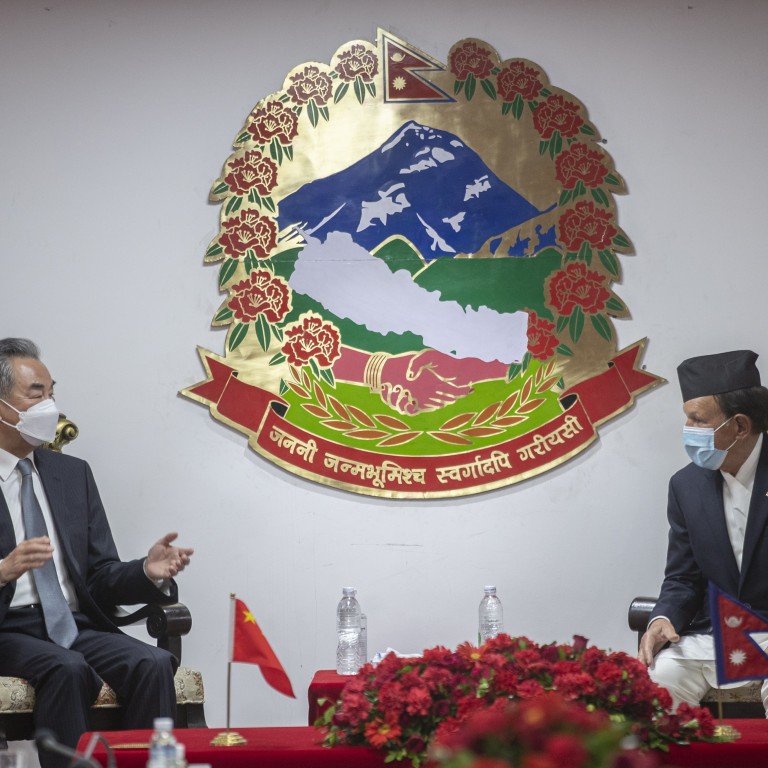
China warns Nepal of external interference threat in US grant wake
- In Kathmandu, Chinese foreign minister says core interests of two neighbours could be undermined
- Wang Yi’s trip a reminder to Nepal not to be drawn into becoming an anti-China front, observer says
In talks with his Nepali counterpart Narayan Khadka and Prime Minister Sher Bahadur Deuba in Kathmandu on Saturday, Wang repeated Beijing’s position of “non-intervention” and respect for the “sovereignty, independence and territorial integrity” of all countries.
“China will work with Nepal to safeguard the principle of non-interference in internal affairs and … resist unilateralism and oppose power politics, and contribute to regional peace and stability,” the foreign ministry quoted Wang as saying.
“China believes that the affairs of Nepal should be decided by its people. China opposes any attempts to undermine Nepal’s sovereignty and independence, interfere in its internal affairs and engage in geopolitical games in Nepal.”
Khadka reaffirmed Nepal’s commitment to the one-China policy and to “not allow any activity against China on Nepali territory”, according to The Himalayan Times, a newspaper based in Kathmandu.
The MCC grant is earmarked for badly needed infrastructure, which is also a focus of the belt and road programme.
The grant is controversial and prompted protests in Nepal but the country’s parliament approved it last month.
Wang Dehua, a regional affairs expert at the Shanghai Municipal Centre for International Studies, said Beijing saw the MCC funding as Washington’s attempt to counteract China’s belt and road programme.
“Wang Yi’s remarks are aimed at reminding Nepal, which is sandwiched between the giant powers of China and India, to remain neutral and not be dragged by the US and India into becoming an anti-Chinese front,” he said.
Nepal approves contentious US aid grant despite protests
Zhao Gancheng, a researcher with the Shanghai Institutes for International Studies, said some Nepali political parties saw the grant as undermining the country’s laws and sovereignty, raising concerns that the American projects would become part of Washington’s Indo-Pacific strategy – a misgiving shared by Beijing.
“There are not any natural resources in Nepal. The key reason the Americans decided to build MCC infrastructure projects there is its geopolitical location – its more than 1,200km (745 miles) of border with China,” Zhao said.
“Nepal is not only an important neighbour to China in the Himalayas, but also has a strategic role between China and India under Beijing’s belt and road. China needs to make sure any foreign forces will not use its territory to jeopardise the two countries’ long-term cooperation.”
Why is the US struggling to give US$500 million to China-friendly Nepal?
However, Gupta Yogesh, a former Indian ambassador to Denmark and a specialist in China-India relations, said the MCC projects were designed to strengthen transport links between India and Nepal, providing a steady income to Nepal, creating new jobs and stimulating local economic growth.
“It is for Nepal to decide whether its rail link with China will be cost effective considering that its major trade, transport and infrastructure links are with India,” he said.
“It is hoped that this will not be another white elephant project like Hambantota and Gwadar ports in Sri Lanka and Pakistan, which have not attracted many users.”
But Wang Dehua said the MCC projects in India and Nepal might not be enough to challenge the Chinese initiative because many other South Asian countries, including Pakistan and Bangladesh, were willing to work with China.
The Himalayan Times and Chinese state news agency Xinhua said the two foreign ministers also signed and exchanged nine agreements and cooperation documents covering economics, technology, agriculture, infrastructure and public health.
Both sides also agreed to complete the Sino-Nepali cross-border railway project stretching from Shigatse in Tibet to Kathmandu, according to Xinhua.
“Nepal will benefit the most if the Sino-Nepali railway is completed, as the project could alleviate its overreliance on the Indian transport network, a pragmatic approach to balance its relations between Beijing and New Delhi,” Wang Dehua said.


